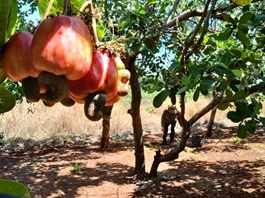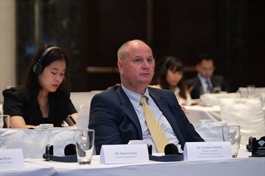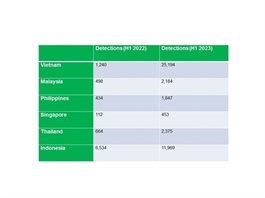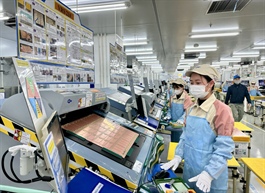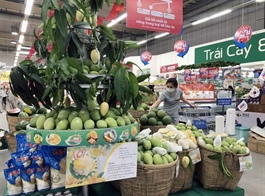Practical power direction can propel SOE fortunes
Practical power direction can propel SOE fortunes
Experts have agreed that refining the model of state capital agencies is one of the most critical aspects in enhancing the efficiency of state-owned enterprises, transforming them into pioneering forces in the economy.

At a seminar last week co-hosted by VIR and the Commission for the Management of State Capital at Enterprises (CMSC), Pham Van Son, head of the CMSC’s General Department, said that the 19 groups and corporations under it have undergone significant changes in the past few years.
As of the end of 2022, the total consolidated ownership capital of these groups and corporations accounted for approximately 63 per cent of the total equity and 65 per cent of the total assets of state-owned enterprises (SOEs).
“In comparison to 2018, the total consolidated equity increased from over $45.6 billion to more than $49.6 billion, and the total consolidated assets rose from over $98.5 billion to $103.8 billion. Key production and business indicators achieved annual growth,” he said.
Notably, these 19 groups and corporations have received approval, implemented, and completed investments in 185 group A projects and 455 group B projects. Since 2018, the commission, in tandem with various entities, has spearheaded developmental investment plans, with the aggregate investment value approximating to $32.47 billion.
However, SOEs are still facing limitations in their investment, production, and business activities. Nguyen Duc Trung, deputy director of the Enterprise Development Agency of the Ministry of Planning and Investment, pointed out several ways in which efficiency has not proportionally matched the resources they hold, falling short of expectations.
“Large SOEs have not clearly demonstrated their prominent role in leading, motivating, and driving the development of other economic components,” he said. “Some conglomerates and SOEs have reported negative profits, including significant and influential ones.”
Trung assessed that SOEs have not prioritised investments in motivating sectors and fields. Despite holding over 60 per cent of the nation’s resources, these entities have not undertaken large-scale development projects to provide impetus for growth, promote ripple effects, and enhance economic competitiveness, while the overall competitive capacity and the application of science and innovation remain limited.
“Certain ventures have faced delays in implementation, and the process of final settlement for fundamental construction projects has extended, diminishing the efficiency of resource utilisation,” he noted.
According to economist Vo Tri Thanh, related to the management of SOEs, it is essential to identify major issues.
“We often mention that SOEs struggle to be effective in a market economy due to conflicts of interest. This is something even private companies and joint-stock companies encounter,” he said. “Conflict can be reduced based on certain principles, the first being transparency, and the second being oversight.”
Thanh suggested that the principle committee should act as an investor, which can be likened to the model of a fund management company with various funds, each with different responsibilities and strategies. Some countries, including Singapore, employ a similar model.
“The capital management committee should be able to flexibly decide on investments, transfers from surplus in one conglomerate to another. There is also investment in acquiring technology, divesting from another company, and adapting to market demands, trends, and technology,” he explained, adding that this approach can be combined with sandbox testing in terms of autonomy, investment authority, and access to research and development.
Son of the CMSC believes that there is a need to decentralise and increase practical powers for the committee in coordinating capital between enterprises. “Some enterprises have surplus capital that they cannot use, while others lack capital, while the law does not allow capital to be allocated between units. This is causing a waste of resources that businesses are holding,” Son said.
In the same vein, Nguyen Duc Kien, head of the Economic Advisory Team to the Prime Minister, suggested a mechanism for allocating capital for a phase instead of assessing the efficiency of individual projects. This approach aims to provide greater autonomy to businesses for their medium and long-term plans.
“It’s not only about creating a transfer mechanism, but also about having the courage to implement it. This means there should be clear and specific regulations on effective capital utilisation; otherwise, no one would dare to do it,” he emphasised, suggesting that the Organisation for Economic Co-operation and Development corporate governance principles for SOEs may be considered for a more appropriate capital management approach.



